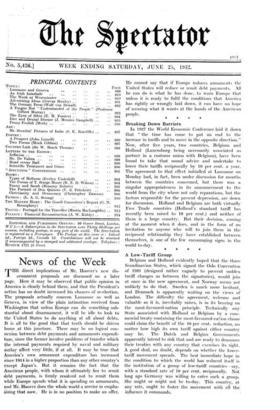A Low-Tariff Group Belgium and Holland evidently hoped that the
three Scandinavian States, which signed the Oslo Convention of 1981 (designed rather vaguely to prevent sudden tariff changes as between the signatories), would join at once in the new agreement, and Norway seems not unlikely to do that. Sweden is much more hesitant, and Denmark is apparently waiting on the views of London. The difficulty the agreement, welcome and valuable as it is, inevitably raises, is in its bearing on the most-favoured-nation principle. Technically any: State associated with Holland or Belgium by a com- mercial treaty containing the most-favoured-nation clause' could claim the benefit of the 10 per cent, reduction, no matter how high its own tariff against either country may be. The Dutch and Belgian Governments apparently intend to risk that and are ready to denounce their treaties with any country that exercises its right. A good deal, no doubt, depends on whether the lower- tariff movement spreads. The best immediate hope in the condition to which the world has reduced itself is the institution of a group of low-tariff countries—say,: with a standard rate of 10 per cent. reciprocally. Not long ago Germany was willing to enter such a group. She might or might not be to-day. This country, at any rate, ought to foster the movement with all the influence it commands.


































